 “…war is always the proof of failure and the worst of solutions, so everything must be done to avoid it.” — (French President Jacques Chirac, 2003)
“…war is always the proof of failure and the worst of solutions, so everything must be done to avoid it.” — (French President Jacques Chirac, 2003)
Schizophrenia: (definition) a mental disorder characterized by a breakdown in the relations between thought, emotion and behavior leading to faulty perception. inappropriate actions or feelings, withdrawal from reality… Sounds like the right diagnosis for the past and present “leaders of the free world.” Post World War II presidents whose disconnect between “thought” and “behavior” is nothing short of mind-boggling, running the gamut of reining in the perpetual war whoops emanating from and deeply embedded in the zeitgeist of military culture and at one and the same time deferring to their “wisdom” and experience (as in “light at the end of the tunnel”— General Westmoreland on the prospect of victory in Vietnam).
The lesson all successful politicians learn early in their career is public opinion matters and in the case of presidents and congresses, particularly within the last decade, they enjoy little support from the public. That creates a situation where civilian leaders who have the confidence and strategic vision to buck the military hesitate to do so. The military has no such reservations winning hands down in the court of public opinion outstripping the approval ratings of all three branches of government — executive, legislative and judicial. The most despised branch is Congress, which rates a woeful 15% public approval (two points higher than last week). Only a tad more than one-third of Americans approves of the job the President is doing — beyond dismal considering that he’s only four months into his term, and should be enjoying his honeymoon. The third branch of government, the judiciary, manages to favorably impress 42% of the public. But that figure is misleading. As the least public of the three, that approbation is probably based more on omission (except for the confirmation of the ninth justice who got a flurry of media attention), the media gaze is generally fixed on the other two branches) rather than anything more substantive.
All their ratings pale when compared to the public adoration the military inspire. Call it xenophobia, hero worship, or an engrained sense that an exceptional nation deserves an exceptional military. Whatever the case, 73% of our fellow citizens have been conditioned to believe that the military is their bulwark against the empire’s many enemies. “Keeping us safe” and “honoring their service” are two of the many patriotic buzzwords that have successfully brainwashed an entire nation. All of which puts Congress and the President in a very tenuous position. Saying no to the demands of the military for more troops, more weapons, more planes, more war, risks political suicide. 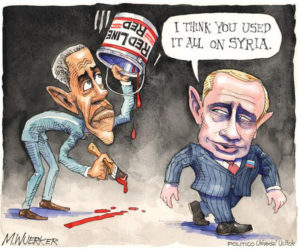 An object lesson is what happened to President Obama when he defied the demands of the military and the war hawks on his own staff and turned thumbs down on military action in Syria. In articles like “Syria Will Stain Obama’s Legacy Forever,” on television, on the internet, Obama was labeled as “weak” on terrorism and it stuck.
An object lesson is what happened to President Obama when he defied the demands of the military and the war hawks on his own staff and turned thumbs down on military action in Syria. In articles like “Syria Will Stain Obama’s Legacy Forever,” on television, on the internet, Obama was labeled as “weak” on terrorism and it stuck.
Throughout the post-war period, democratic presidents tend to put up more of a fight when the pressure builds up to apply military solutions to the conduct of foreign policy. Adding to the chorus of yeas to bomb, invade or insert troops coming out of the military are the war hawks in state and defense riding the military bandwagon. A President who challenges the military often may find himself without a lot of allies within his own administration. On the other hand, Republican presidents rarely found themselves in this bind, starting from a position to the right of Attila the Hun, they were (and still are), willing dupes in the grand scheme of perpetual war—always a popular topic at republican conventions. 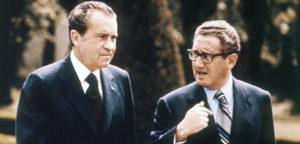 A classic example is Richard Nixon and his “madman” strategy, a bizarre plan Nixon was convinced would bring Ho Chi Minh to the bargaining table. Nixon believed that if the North Vietnamese thought he was unpredictable to the point of madness and might possibly consider dropping a nuclear bomb they would be more willing to give in to American demands. In a bizarre twist, there is considerable evidence that Nixon may truly have been unhinged. As he told Henry Kissinger, his national security advisor and later secretary of state, in one of their private confabs: “I’d rather use the nuclear bomb… [on North Vietnam].” Kissinger, who was as cold-blooded as Nixon but more protective of his legacy was horrified: “That, I think, would just be too much.” Nixon’s comeback “A nuclear bomb, does that bother you…I just want you to think big, Henry, for Christ’s sake…You’re so goddamned concerned about civilians and I don’t give a damn. I don’t care.”
A classic example is Richard Nixon and his “madman” strategy, a bizarre plan Nixon was convinced would bring Ho Chi Minh to the bargaining table. Nixon believed that if the North Vietnamese thought he was unpredictable to the point of madness and might possibly consider dropping a nuclear bomb they would be more willing to give in to American demands. In a bizarre twist, there is considerable evidence that Nixon may truly have been unhinged. As he told Henry Kissinger, his national security advisor and later secretary of state, in one of their private confabs: “I’d rather use the nuclear bomb… [on North Vietnam].” Kissinger, who was as cold-blooded as Nixon but more protective of his legacy was horrified: “That, I think, would just be too much.” Nixon’s comeback “A nuclear bomb, does that bother you…I just want you to think big, Henry, for Christ’s sake…You’re so goddamned concerned about civilians and I don’t give a damn. I don’t care.”
Before Nixon, another republican, Eisenhower ruled the roost. In 1961, several days before the end of his second term, he warned the nation— “In the councils of government, we must guard against the acquisition of unwarranted influence, whether sought or unsought by the military-industrial complex.”
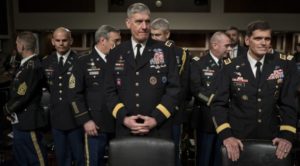
For those who give farewell addresses about as much credence as dying declarations, Ike’s parting shot comes across as “too little, too late.” After all, this is the President who conceived of “pre-delegation” — an end-run around civilian control of nuclear weapons granting high ranking commanders authority to use nuclear bombs in response to an enemy attack (conventional or nuclear) when they were unable to reach him. (For more on this dangerous deference see “Who Controls Nuclear Weapons? The Answer May Shock You”). This is also the president who in 1956 and in 1959 gave the military custody of thermonuclear weapons (hydrogen bomb) and the authority to use these immensely powerful weapons in air defense. Even earlier, when the French were fighting the North Vietnamese, a declassified report of a secret meeting with Ike, Chairman of the Joint Chiefs Arthur Radford and Secretary of State Dulles stated that Ike “agreed with Dulles and Radford on a plan to send American forces to Indochina…”
George W. Bush is a more current example of Republican hero worship of everything that goes bang-bang in the night. No more fervent cheerleaders for the endless parade of “honor the troops” celebrations at virtually every public event, from professional sports to the elementary school play can be found than among those, including George Bush, who will sleep soundly in their beds while young men and women fight and sometimes die in wars that seem to sprout like chin hairs from the wet dreams of generals and admirals. President Bush put his faith in the military — “Our commanders on the ground will determine the size of troop levels…” Look where that got us. Almost two decades later and the wars expand, civilians and soldiers are still dying and the countries we set out to make safe for democracy are wastelands.
Democratic presidents as we’ve noted have a little more trouble getting their heads wrapped around the necessity for undue deference to military brinkmanship. Unfortunately for many young American soldiers, their high-minded determination to adhere to Article 2 of the Constitution — “The President shall be the Commander in Chief of the Army and Navy of the United States…”— waxes and in too many instances wanes when confronted with the sunny optimism of military commanders engaged in combat operations. Sometimes the military oversteps even the wide latitude they are given by civilian leaders. One of the more outlandish schemes cooked up by the Joint Chiefs was in 1962 at the time of the Cuban missile crisis. The goal — to ramp up public support for a war against Cuba. Operation Northwoods, was a potential disaster masquerading as military strategy: “blow up a U.S. ship in Guantanamo Bay and blame Cuba…casualty lists in U.S. newspapers would cause a helpful wave of public indignation. JFK’s response to this and other military misfires, miscalculations and miscellaneous blunders “These brass hats (generals and admirals) have one great advantage. If we…do what they want us to do, none of us will be alive later to tell them that they were wrong.” He got even more passionate on the subject of outrageous military advice when the military saber rattling for a nuclear strike against Cuba increased in volume. “The first thing I’m going to tell my successor is to watch the generals and to avoid feeling that just because they were military men, their opinions on military matters were worth a damn.”
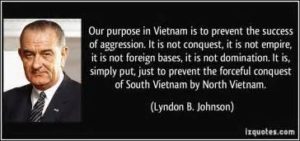 Unfortunately, JFK never had a chance to tell his successor anything. He didn’t need to. Lyndon Johnson (LBJ) who became President after Kennedy’s assassination quickly saw the handwriting on the wall for himself (and just as quickly ignored it). In April, 1965 in a phone conversation with Senator Mike Mansfield, Majority Leader, his frustration is on full display “…all of my generals tell me…that we cannot do this [stay in Vietnam and continue fighting] with the commitment we have now. It’s got to be materially increased and the outcome is not really predictable at this time.” In June of 1965, his skepticism is evident — “The military [Joint Chiefs] don’t say that putting these people in is going to win but…if you don’t put them in, you’re going to lose. That same month, his frustration at the advice he was getting reached an all-time high. “I’m no military man…[but] I look back over what’s happened in the last two years, the last four really, and if they [the military] get 150,000, they’ll have to have another 150,000. And then they’ll have to have another 150,000…”
Unfortunately, JFK never had a chance to tell his successor anything. He didn’t need to. Lyndon Johnson (LBJ) who became President after Kennedy’s assassination quickly saw the handwriting on the wall for himself (and just as quickly ignored it). In April, 1965 in a phone conversation with Senator Mike Mansfield, Majority Leader, his frustration is on full display “…all of my generals tell me…that we cannot do this [stay in Vietnam and continue fighting] with the commitment we have now. It’s got to be materially increased and the outcome is not really predictable at this time.” In June of 1965, his skepticism is evident — “The military [Joint Chiefs] don’t say that putting these people in is going to win but…if you don’t put them in, you’re going to lose. That same month, his frustration at the advice he was getting reached an all-time high. “I’m no military man…[but] I look back over what’s happened in the last two years, the last four really, and if they [the military] get 150,000, they’ll have to have another 150,000. And then they’ll have to have another 150,000…”
As it turned out, Presidents Kennedy and Johnson were unable or unwilling to withstand the pressure of a bunch of stuffed shirts with lots of shiny medals. LBJ who considered himself an “accidental’ president told friends and advisors that he didn’t want to “lose Vietnam” the way President Truman was accused of “losing” China in 1949. Once again political considerations trumped good sense. The losers? Thousands of soldiers, many drafted against their will, (the draft didn’t end until Nixon get rid of it in 1973) who died in the steamy jungles of Vietnam. Listening to the generals destroyed LBJ’s presidency, left the war on poverty in shambles, and forced him to withdraw from the 1968 presidential race. Kennedy’s assassination was the only thing that stood between him and public humiliation as Camelot was transformed into hell on earth —at least for 58,000 young Americans, their grieving families, the millions of Vietnamese, Cambodians, and Laotians who died and at least 304,000 wounded soldiers whose lives were upended, many permanently.
Martin Luther King, Jr. nailed it 50 years ago when he diagnosed the perils of a country that blindly follows its military leaders into disaster and despair. “As I have walked among the desperate, rejected and angry young men I have told them that Molotov cocktails and rifles would not solve their problems. I have tried to offer them my deepest compassion while maintaining my conviction that social change comes…through non-violent action. But they ask…what about Vietnam? They ask if our own nation wasn’t using massive doses of violence to solve its problems… Their questions hit home and I knew that I could never again raise my voice against the violence of the oppressed in the ghetto without first having spoken clearly to the greatest purveyor of violence in the world today—my own government.”
Today as we look uneasily at threats coming out of nuclear armed North Korea, U.S. military action in seven countries in the Mid-East and Africa, U.S. complicity with Saudi Arabia and Bahrain in the destruction of Yemen, the deaths of hundreds of innocent civilians, the growing starvation of millions of Yemenis and U.S. military presence in 139 countries, we wonder whose advice President Trump will take — that of active duty and retired admirals and generals whom he has sprinkled liberally throughout his administration or civilian leaders with lots of experience in negotiating peace, in thinking strategically, endowed with the confidence and wisdom to slam the lid on this Pandora’s box of war, war, and more war. Miracles are possible but as early as Inauguration Day President Trump has seemed eager to surrender the keys to the candy story to the Joint Chiefs. On what should have been his proudest moment taking on the leadership of a powerful and it must be admitted dangerous country, 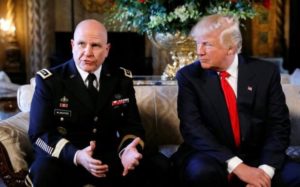 President Donald Trump pointed proudly to a phalanx of military brass and spoke the sentence that must have sounded like music to their ears “I see my generals, generals that are going to keep us safe.”
President Donald Trump pointed proudly to a phalanx of military brass and spoke the sentence that must have sounded like music to their ears “I see my generals, generals that are going to keep us safe.”
Come to think of it what he really needs is a history lesson.
We are headed to Twitter! . . . finally taking a plunge into the world of social media. Follow us at @SUSPIANGELS Though deciding on our first official Tweet has been a bit stupefying. . .
712 total views, 1 views today
